
32.3K
Downloads
59
Episodes
Social Protection Podcast is brought to you by socialprotection.org. We’re a knowledge sharing and capacity building platform, open to social protection practitioners, policy-makers, and experts, as well as academics and students. Social protection is a large and growing field, that has also achieved increased profile and salience since 2020 due to COVID-19. From building delivery systems and protecting People with Disabilities, to social protection financing and school feeding – there is no shortage of topics for Social Protection Podcast to tackle. Each month we will aim to bring you rich, interesting and different content. Through interviews, discussions and debates with experts and practitioners, Social Protection Podcast will illuminate new research and bring a range of perspectives to debates and controversies as well as areas of growing consensus.
Episodes

Thursday Mar 24, 2022
Ep. 12 | What will it take to achieve USP by 2030?
Thursday Mar 24, 2022
Thursday Mar 24, 2022
This month, we celebrate our first year of the Social Protection Podcast. Over 16 episodes, we have explored controversial ideas like Universal Basic Income, dived deep on landmark programmes like Bolsa Familia and explored the impact of the COVID-19 pandemic on social protection systems worldwide.
In this episode, we are talking about another ambitious agenda, Universal Social Protection or USP2030. Under the co-leadership of the World Bank and the International Labour Organisation, USP2030 was created with a mission to achieve social protection for all at any time. To this end, it urges countries and international partners to support the global commitment to implement nationally appropriate social protection systems and measures for all, including floors, by 2030.
The third USP 2030 membership assembly will be held this month and we thought this would be a good opportunity to discuss one of the many paths to expanding social protection. We have asked our guests to reflect on approaches that blur the traditional lines between social assistance and social insurance and what it might take to reach that ambitious 2030 goal.
Our guests for this episode are:
- Maliki, Director for Poverty Alleviation and Community Empowerment, Ministry of national Development Planning
- Shea McClanahan, Senior Social Policy Specialist, Development Pathways
Plus, to contribute to our monthly segment of ‘Quick Wins’ which highlights news, achievements, and research that have shaped recent developments and sparked our interest, we heard from:
- Veronika Wodsak, Social Protection Policy Specialist, ILO
Resources:
Disability - Social Protection - Inclusion: Dialogue for change
Global partnership for Universal Social Protection to achieve the Sustainable Development Goals
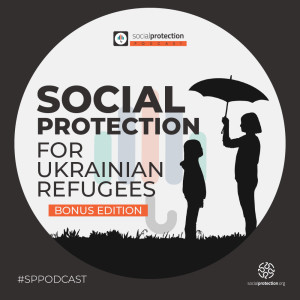
Friday Mar 11, 2022
Ep. 11 | Bonus Edition | Social Protection for Ukrainian Refugees
Friday Mar 11, 2022
Friday Mar 11, 2022
Since the conflict in Ukraine broke out at the end of February, the world has witnessed the fastest growing refugee crisis since World War II, with over two million people – mostly women, children and the elderly- fleeing into neighbouring countries.
The outpouring of voluntary support and solidarity for Ukrainian refugees has been remarkable. But for those without family and friends in the region, what institutional support is available, and what will refugees be able to access in the long term?
In this episode, we look at the roles social protection systems in receiving countries, along with humanitarian cash-based interventions, are playing in the response.
Our guest for this episode is:
- Susanne Klink, Livelihoods and Socio-Economic Inclusion lead for UNHCR, the UN Refugee Agency, Regional Bureau for Europe
Links from this episode:
UKRAINE SITUATION FLASH Update 1, UNHCR, March 8th
Ukraine Refugee situation data portal, UNHCR
Social protection: Integration Policy Brief I, UNHCR, September 2021
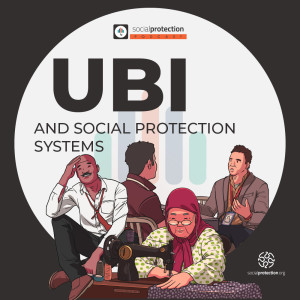
Thursday Feb 24, 2022
Ep. 10 | UBI and social protection systems
Thursday Feb 24, 2022
Thursday Feb 24, 2022
This is the second of a two-part series about UBI. You can find the first episode here.
This month we continue our discussion on the Universal Basic Income (UBI), a radical idea to extend regular, unconditional cash benefits to everyone. The UBI challenges certain social protection orthodoxies, for example by providing an equal amount of support to all, independent of needs, and by removing obligations on the part of recipients in order to receive benefits. There are different views on how generous a UBI should be, whether it’s in addition to, or replaces other forms of social spending. And the literal multi-billion dollar question is – how to pay for it!
This episode is the second of a two-part series on UBI. In the first episode, our guests discussed the implications of UBI for the world of work. If you missed it, we suggest you start there.
In this second episode, we ask our guests to reflect on the ways UBI fits in with social protection systems. The truth is that despite many pilots and trials in countries as diverse as Kenya, Canada, and Finland, no country has managed to implement a full UBI. Drawing from these experiences, we address what is commonly the number one objection to making UBI a reality - namely, cost. More specifically, we delve into aspects of affordability (How can countries finance it? How generous should it be?), equity (How to address specific deficits?), and, ultimately, its feasibility (Can it ever be achieved?).
Our guests for this episode are:
- Francesca Bastagli, Director of the Equity and Social Policy programme and Principal Research Fellow at ODI.
- Jurgen De Wispelaere, Assistant Professor at the Stockholm School of Economics in Riga and Adjunct Professor in Philosophy of Social Policy at Tampere University
Plus, to contribute to our monthly segment of ‘Quick Wins’ which highlights news, achievements, and research that have shaped recent developments and sparked our interest, we heard from:
- Jim Pugh, co-founder of the US-based Universal Income Project.
Links from this episode:
Maid (Netflix show)
The Upswing: How America Came Together a Century Ago and How We Can Do It Again | interview
Emergency Basic Income during the Pandemic
The Rise (and Fall) of the Basic Income Experiment in Finland
Exploring Universal Basic Income: A Guide to Navigating Concepts, Evidence, and Practices
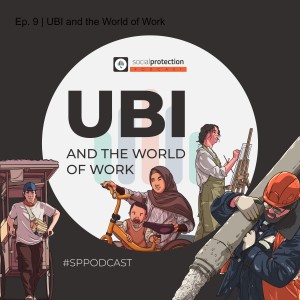
Thursday Jan 27, 2022
Ep. 9 | UBI and the World of Work
Thursday Jan 27, 2022
Thursday Jan 27, 2022
This is the first episode of a two-part series about UBI. You can find the second episode here.
The first episode of the year in the Social Protection Podcast brings a radical proposal for extending social protections: the Universal Basic Income, or UBI.
Fundamentally, a universal basic income is a benefit provided in cash without conditions to everyone. It is a large topic that has been generating heated discussions in the social protection field for many years now. In that sense, we divided this discussion into two episodes.
In this episode, we'll focus on the UBI and the World of Work. Fears around automation and the changing nature of work fuel popular and policy interest in the UBI. But the prevailing narrative that welfare makes people lazy and less inclined to work may be one of the biggest obstacles to overcome if a UBI is ever to be achieved.
We'll unpack the evidence around whether a UBI could change the way we value work and what that could mean for gender equality and workers' bargaining power. We'll also look at how arguments for and against the UBI play out across the political spectrum.
Then in next month's episode, we'll look at how a UBI could fit more broadly into social protection systems, asking whether it would be a major disruption or just another plank in the social protection floor.
Our guests for this episode are:
- Francesca Bastagli is Director of the Equity and Social Policy programme and Principal Research Fellow at ODI.
- Jurgen De Wispelaere - Assistant Professor at the Stockholm School of Economics in Riga and Adjunct Professor in Philosophy of Social Policy at Tampere University and
Links from the episode
Emergency Basic Income during the Pandemic
The Rise (and Fall) of the Basic Income Experiment in Finland
Exploring Universal Basic Income: A Guide to Navigating Concepts, Evidence, and Practices
Webinar - Exploring universal basic income: lessons for COVID-19 response and beyond
Event - BIEN 2022: Crisis and Transformation
Plus our monthly round-up of ‘Quick Wins’, highlighting news, achievements and research that have sparked our interest.
Quick Wins from Zehra Rizvi - Social protection in emergencies specialist (consultant)
The big SP e-Vent: You spoke up, we listened - but what should we do next?
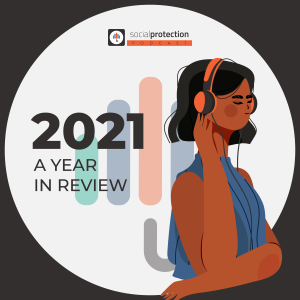
Tuesday Dec 21, 2021
Ep. 8 | 2021: A Year in Review
Tuesday Dec 21, 2021
Tuesday Dec 21, 2021
It's December and we've made it to the end of 2021. This was another year dominated by COVID-19 in the field of social protection - and we've certainly spent plenty of time talking about that on this show. But while we were preoccupied with the pandemic, what else did we see happening in the social protection world?
In this episode, we bring three guests to spotlight non-COVID related news, papers and events from the year just gone. We'll talk about how to design safety nets to reduce gender-based violence, the role of social protection in food systems and on climate change mitigation, as well as a call for Latin American countries to develop welfare states.
We also asked our guests for their new year's resolutions, and, for the first time, our podcast team chimes in with recommendations.
Our guests for this episode are:
- Prof. Armando Barrientos, Professor Emeritus of Poverty and Social Justice at the Global Development Institute at the University of Manchester in the UK and Mercator Fellow at the Global Dynamics of Social Policy at the University of Bremen;
- Alessandra Heinemann
- Garima Bhalla, Economist and Social Protection Specialist at FAO
Links from the episode:
Five things you should know about how safety nets can curb gender-based violence
Social Protection and Labor: A Key Enabler for Climate Change Adaptation and Mitigation
Building welfare states in Latin America, but which type?
Intergenerational nutrition benefits of India’s national school feeding program
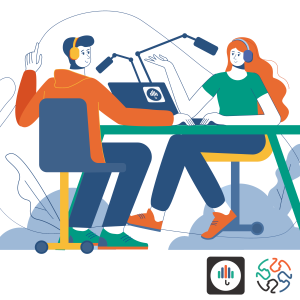
Thursday Nov 25, 2021
Ep. 7 | The path towards social protection floors for all
Thursday Nov 25, 2021
Thursday Nov 25, 2021
We like our metaphors in social protection. We talk about safety nets, even ropes and ladders, to catch people as they fall into poverty, and help them climb out of it. In this episode we’re talking about Social Protection Floors - the nationally defined set of social protection systems that provide basic health and income support guarantees to all citizens.
The crisis created by COVID-19 has shone a light on the gaps in social protection in many countries. But building comprehensive systems takes time and investment and despite international agreements, coverage is still increasing slowly. Between 2017 and 2021, the proportion of the global population covered by at least one social protection benefit increased by just two percent, and over half the world’s population remain completely unprotected.
Our three guests bring unique perspectives on where we are today on the path towards achieving the United Nations' Sustainable Development Goals (SDGs) on social protection. You will hear from Kenya's experience in expanding its social protection; how networks of civil society actors are supporting comprehensive systems around the world; and how the ILO is tracking progress towards this goal and supporting countries in their domestic efforts to finance social protection.
Our guests for this episode are:
- Valérie Schmitt, Deputy Director, ILO Social Protection Department
- Richard Rori, Social Protection Policy and Research Analyst at the National Social Security Fund, Kenya
- Koen Detavernier, Advocacy Officer, We Social Movements (WSM); and Advisor, International Network for Social Protection Rights (INSP!R)
Links from the episode:
R202 – Social Protection Floors Recommendation, 2012 (No. 202)
World Social Protection Data Dashboards
Policy in Focus - What's next for social protection in light of COVID-19: challenges ahead
Resolution concerning the second recurrent discussion on social protection (social security)
Fiscal Space for Social Protection: a handbook for assessing financing options
Building Social Protection Floors for All: Report of the first phase 2016–2020
Extending Social Security to Workers in the Informal Economy
Plus our monthly round up of ‘Quick Wins’, highlighting news, achievements and research that have sparked our interest:
Quick Wins from Karina Levina and Yannick Markhof – participants of this year’s Ambassadors Programme at socialprotection.org
Do Conditional Cash Transfers Improve Education and Labour Market Outcomes in the Future Generation?
Humans of Social Protection – Posts
Widow raising six children in Cameroon Instagram / Facebook
Single mother and school teacher in Kyrgyzstan Instagram / Facebook
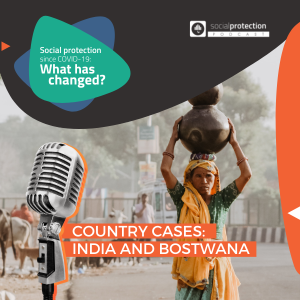
Thursday Oct 28, 2021
Ep. 6 | What‘s changed since COVID-19: Country Cases
Thursday Oct 28, 2021
Thursday Oct 28, 2021
The COVID-19 pandemic has created unprecedented challenges for people and governments worldwide, as well as massive new demands for social protection. It has also sparked an extraordinary collective effort to track developments in the field.
socialprotection.org has played a role in that collective effort, hosting a dedicated online community webinars, papers, and conferences devoted to sharing knowledge on COVID-19, extracting analyses of trends from huge datasets, delving into the details of implementation and lessons learned. And most importantly, sharing all of this knowledge to inform more effective responses.
socialprotection.org is reaching the end of a special campaign celebrating its sixth anniversary. In our last episode, we took a broad view of trends, looking at what some of the most important changes have been—as well as considering those that may have received less attention.
This month, we bring you an in-depth view of social protection programmes in India and Botswana. We'll look at how these were adapted and adjusted to meet the challenges of the pandemic, while considering what lasting effects there might be.
In India, the flagship public works programme had to expand rapidly to accommodate increased demand—and it's greatly expanded budget has driven greater convergence with other forms of public assistance. In Botswana, the government announced last year an overhaul of the country’s social protection schemes to increase the provision of systematic protection across the life cycle in response to the COVID-19 experience.
Our guests for this episode are:
Rajeev Ahal, Director of Natural Resource Management and Agro-ecology at GIZ India, and
Lillian Mookodi, a Research Fellow in the Human and Social Development Unit at the Botswana Institute for Development Policy Analysis (BIDPA), about the changes on the horizon. Lillian also worked with the United Nations on a new social protection strategy for Botswana building on the experiences during the COVID-19 crisis.
Links from the episode:
Botswana National Social Protection Recovery Plan
Impact of COVID-19 on public works programs: policy options in the short and medium term
socialprotection.org's Micro-courses:
What is social protection? An introduction
Social Protection and Rural Poverty
Integrated and digital social protection information systems
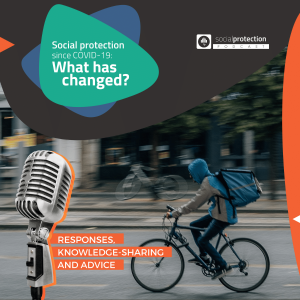
Wednesday Sep 29, 2021
Ep. 5 | What‘s changed since COVID-19: Responses, knowledge sharing and advice
Wednesday Sep 29, 2021
Wednesday Sep 29, 2021
The COVID-19 pandemic has created unprecedented challenges for people and governments all over the world, as well as massive new demands for social protection. It has also sparked an extraordinary collective effort to track social protection development.
Our team at socialprotection.org has played a role in that collective effort, hosting a dedicated online community webinars, papers, and conferences devoted to sharing knowledge on COVID-19, extracting analyses of trends from huge datasets, delving into the details of implementation and lessons learned. And most importantly, sharing all of this knowledge to inform more effective responses.
This month, socialprotection.org celebrates its sixth anniversary by focusing on the remarkable efforts of social protection experts to mobilise knowledge and provide advice to inform the responses to the pandemic.
This will be the first of two episodes exploring what has changed since the COVID-19 outbreak, from the perspectives of people who have been directly involved in global efforts on social protection.
Our guests for this episode are:
Maya Hammad, a researcher at the International Policy Centre for Inclusive Growth (IPC-IG), which earlier this year launched an online interactive dashboard that tracks COVID-19 responses in the global south; and
Edward Archibald, an independent consultant working with the Social Protection Approaches to COVID-19 Expert Advice Helpline, better known by its acronym SPACE, which has been working to advise governments across the globe.
Links from this episode:
SPACE Useful COVID-19 and Social Protection Materials
Methodological note for IPC-IG’s dashboard
What are the lessons learned from the social protection response to the COVID-19 pandemic?
TRANSFORM: Full Document - SRSP
Adaptive Social Protection: The delivery chain and shock response
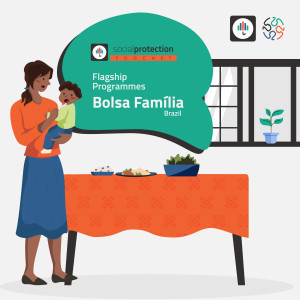
Friday Aug 27, 2021
Ep. 4 | Bolsa Familia | Flagship Special Episode
Friday Aug 27, 2021
Friday Aug 27, 2021
Once in a while, a social protection programme becomes famous. Whether because they are efficient, ground-breaking, innovative - or quite the opposite - , these programmes somehow become part of the popular imagery, serving as an international reference of what to do (or not to do).
These top-of-mind programmes have been researched and evaluated thoroughly for many years, but while you may know their main features and facts, you'll probably less familiar with the disagreement, compromise and evolution that has made them what they are today.
In this episode, we'll speak with three designers and implementers of Brazil's Bolsa Familia program. One of the world's best known conditional cash transfers.
Our guests this week are:
- Luis Henrique Paiva, Research Coordinator at Institute for Applied Economic Research (Ipea)
- Ricardo Paes de Barros, Coordinator of the Centre of Research for the Development of Educational Public Policy at INSPER.
- Tereza Cotta, Specialist in Public Policy and Government Management in the Ministry of Economy of the Federal Government of Brazil.
Links from episode:
Bolsa Família 2003-2010: Avanços e desafios
Great Policy Successes: Brazil’s Bolsa Família Programme
Cadernos de Estudos N.30: Desenvolvimento social em debate
Bolsa Família 15 Anos (2003-2018)
Plus our monthly round up of ‘Quick Wins’, highlighting news, achievements and research that have sparked our interest.
Quick Wins from Fabio Veras from International Policy Centre for Inclusive Growth (IPC-IG):
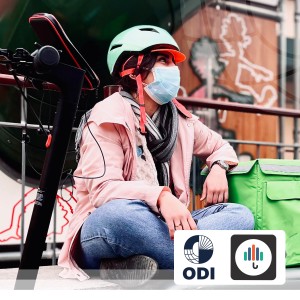
Thursday Jul 22, 2021
Thursday Jul 22, 2021
In the months of June and July, the Social Protection Podcast is hosting a special series in partnership with ODI and GIZ. Across six episodes, our guest host Francesca Bastagli, Director of the Equity and Social Policy programme and Principal Research Fellow at ODI, will moderate conversations around the guiding question: “Covid-19: a turning point for social protection?”.
These six episodes are part of an ODI research project, funded by GIZ, on the emerging evidence and learning from social protection measures adopted in the early months, and within the first year, of the onset of the Covid-19 crisis. It asks how effective have social protection responses to Covid-19 to date been, especially for some of those hardest hit, including refugees, women, informal workers and people living in urban areas? What policy features enabled or hindered adequate crisis response? And, while many of the measures are temporary, what potential opportunities and risks do they present for strengthening social protection in the long term?
The ODI-GIZ study covers six thematic areas, each with an accompanying paper. Each week of this podcast special series, Francesca will be joined by the lead author of one of the papers, along with an expert discussant.
This episode looks at informal workers and social protection during Covid-19 and beyond. Prior to the crisis, many informal workers were faced with little to no access to social protection and healthcare, insecure earnings and precarious work conditions. This made them especially vulnerable to the health and socioeconomic impacts of Covid-19 as the pandemic developed. What social protection measures have been taken to try to extend provision to informal workers during the crisis? How well have these policy measures and adjustments worked in supporting informal workers over the course of the pandemic? And what trade-offs, risks and opportunities do the crisis and subsequent policy adjustments present for filling historic gaps in social protection for informal workers on a permanent basis?
This episode was inspired by the ODI-GIZ project thematic paper “Extending social protection to informal workers: Emerging lessons from Covid-19 crisis response” by Laura Alfers and Francesca Bastagli (forthcoming).
Our guests this week are:
- Laura Alfers, Director of the Social Protection Programme, WIEGO
- Gautam Bhan, Faculty Member, Indian Institute of Human Settlements
Episode links
Webinar recording - Taking stock at the one-year mark: social protection during COVID-19 and beyond
COVID-19, Informal Workers and WIEGO’s Work during this Crisis
WIEGO: Social Protection Responses to COVID-19
Lessons for Social Protection from the COVID-19 Lockdowns Report 1 of 2: State Relief
